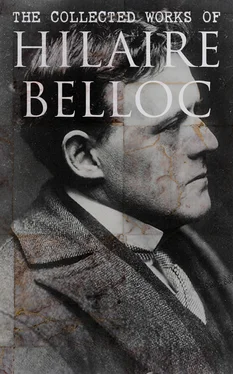But of all the relics of antiquity the prehistoric road is the most difficult to establish.
These old tracks, British, and (if the word has any meaning) pre-British, though they must abound in the island, have become most difficult to reconstitute.
The wild, half-instinctive trail of men who had but just taken on humanity: later a known and common track, but a track still in the hands of savages for countless generations, a road of this kind is preserved by nothing stronger than habit. No mathematical calculation presided at its origin, none can therefore be used to reconstruct it when it has been lost. When (as in the last phase of the road which is the subject of this book) religion may have prolonged its use into historic times, that influence is capable indeed of perpetuating a tradition; but though religion maintains a shrine or a legend it does not add those consistent records of material works which are the best guide for the research of posterity.
The Old Road was not paved; it was not embanked. Wherever the plough has crossed it during the last four hundred years, the mark of it is lost.
From the clay it has often disappeared: from marshy soil, always. On the chalk alone has it preserved an unmistakable outline. Nor can it be doubted that it would have vanished as completely as have so many similar roads upon the Continent and in our own Midlands, had it not been for one general, and three particular, influences which, between them, have preserved a proportion of it sufficient to serve as a basis for the exploration of the remainder.
The general influence was that political sequence by which England has developed a peculiar power for retaining the evidences of her remote past. The three particular influences were, first, the Canterbury pilgrimage; secondly, the establishment of a system of turnpikes in the eighteenth century; thirdly, and most important of all, the chalk.
Consider first the general influence: the effect of English society upon this matter.
This little district of the world is a very museum of such primitive things as lie at the basis of society: of such immaterial things as our existing relics of barbaric polity: of such material things as early systems of defence, the tombs of various forgotten races, the first instruments of iron, bronze and stone; and of my own subject here, the primeval track-ways, in what way has our political history helped to preserve them?
The Empire held this province sufficiently to preserve, but not so thoroughly as to destroy. The districts bounded but untraversed by the great military roads which fed the frontier garrisons must have been left in part autonomous; forbidden indeed to disturb the peace, but not transformed by an ubiquitous administration.
Flourishing as were the very numerous towns, and large as their combined populations must have been, they seem to have remained to the end an archipelago surrounded as it were by a sea of forest and heath, wherein could be found a thin but permanent population, preserving its own language and its tribal system, in touch with the unconquered tribes beyond the Grampians and the Irish Sea, and remaining to the end but half-impressed with the stamp of Latin government.
The picture is but general; exceptions are numerous. Roman estates were cultivated peacefully far from the towns, and certainly nothing dangerous to the ruling man could befall him in the half-conquered tracts of which I speak; but in the rough the picture is true.
Now such a state of things would have among other results this: that it would not destroy the habits of the barbarians, it would crystallise them.
Under such conditions a great activity and wealth accentuated the use of a hundred pre-Roman things. The prosperity which the barbarians enjoyed, the markets in the towns which they must have frequented, would multiply their ancient instruments and would put to a continual use their native trails; and these, as I have pointed out, were not to any great extent overlaid by or forgotten in the new civilisation.
Whatever Gaulish track may have led from Paris to Orleans (and it is historically certain that such a trail did run through the woods to the south of Lutetia), or whatever old track-way was carried along the north of the Apennines, both have wholly disappeared. The great straight causeway of Rome cutting across the Beauce has killed the one, the Æmilian Way the other. So it is throughout nearly all the land which Rome developed, with the exception of this province; here the fragments of a score of British track-ways survive.
When the Empire fell the nature of our decline equally preserved our past. Alone of the Roman provinces the eastern half of Britain was really ruined. It had been exposed for two centuries to the attacks of pirates who came from the unconquered and inexhaustible north. Remote, an Island, impoverished, the first of the frontiers to be abandoned, it was at last overwhelmed: to what extent we can only guess, and in what manner we cannot tell at all, but at any rate with sufficient completeness to make us alone lose the Faith which is the chief bond of civilisation.
The interval was short. There is still some glimmering of light in the middle of the fifth century. In little more than a hundred years communication was reestablished with the Continent, and before the sixth century had closed St. Augustine had landed.
The anarchy had covered a gap no greater than the interval which separates us from the Declaration of Independence, but it had been sufficient to restore to the island the atmosphere of barbarism. There was no Palace, nor any such central authority as everywhere else maintained in the provinces the main traditions of Rome. In the west a medley of Celtic, in the east a confusion of Teutonic dialects had drowned the common medium of thought.
Religion itself when it returned was coloured by the simplicity and folly of the ruin. In the west the unity of Christendom was hardly comprehended, in the east the town of Rome became for the Anglo-Saxons the subject of a sort of idolatry. Letters, geography, common history, glass, and the use of half the metals were forgotten. Not till the Latin re-conquest in the eleventh century was the evil overcome and an organisation at last regained.
But this catastrophe, deplorable as it still remains to history, has proved of the highest value to antiquarians. It produced indeed fantastic legends, stories of the landing of the Horse and the Mare, of Cerdic, Port, Cymric and Wightgar, which have disturbed our national tradition, and which an ignorant bias has credited almost to our own day: alone, therefore, of Western nations have we suffered a real gap in our national story. On the other hand, this gap re-created, as I have pointed out in a former page, those conditions under which the primitive values of hill, wood, marsh, and river reappeared.
The sight of such and such a group of ancient habitations, the meaning to unprotected men of such and such a physical opportunity for defence, in a word, all the influence which topography could exercise on the rudest and most remote of our ancestors, grew real again in the welter and breakdown which we call the Anglo-Saxon period. The artifice and clear creative power of the Mediterranean races was gone: it has never wholly returned to these shores; and what this time chose for the building of cities or the use of roads or of places for defence, is ever an excellent indication of what men had also done long before the Romans came.
How our past has further been preserved by the shape and moulding of the land I shall describe more fully in a further page. There remain to be mentioned two political forces equally conservative. The first is that species of lethargy and contempt which has forbidden us, as it has forbidden every other aristocratic community, to destroy the vestiges of its past. The second is a power more especial but closely allied to this, I mean the influence of the few great owners of the soil.
Читать дальше












